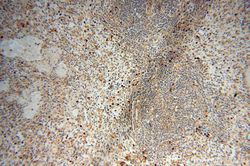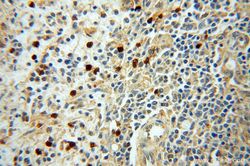Antibody data
- Antibody Data
- Antigen structure
- References [5]
- Comments [0]
- Validations
- Western blot [1]
- Immunohistochemistry [2]
Submit
Validation data
Reference
Comment
Report error
- Product number
- 17535-1-AP - Provider product page

- Provider
- Proteintech Group
- Proper citation
- Proteintech Cat#17535-1-AP, RRID:AB_2158929
- Product name
- PARP9 antibody
- Antibody type
- Polyclonal
- Description
- KD/KO validated PARP9 antibody (Cat. #17535-1-AP) is a rabbit polyclonal antibody that shows reactivity with human, rat and has been validated for the following applications: IHC, IP, WB,ELISA.
- Reactivity
- Human, Rat
- Host
- Rabbit
- Conjugate
- Unconjugated
- Isotype
- IgG
- Vial size
- 20ul, 150ul
Submitted references KH-like Domains in PARP9/DTX3L and PARP14 Coordinate Protein-Protein Interactions to Promote Cancer Cell Survival.
An Alternative Splicing of Tupaia STING Modulated Anti-RNA Virus Responses by Targeting MDA5-LGP2 and IRF3.
PARP9 is overexpressed in human breast cancer and promotes cancer cell migration.
Exosomes Serve as Nanoparticles to Deliver Anti-miR-214 to Reverse Chemoresistance to Cisplatin in Gastric Cancer.
Ubiquitin Modification by the E3 Ligase/ADP-Ribosyltransferase Dtx3L/Parp9.
Saleh H, Liloglou T, Rigden DJ, Parsons JL, Grundy GJ
Journal of molecular biology 2024 Feb 15;436(4):168434
Journal of molecular biology 2024 Feb 15;436(4):168434
An Alternative Splicing of Tupaia STING Modulated Anti-RNA Virus Responses by Targeting MDA5-LGP2 and IRF3.
Xu L, Yu D, Peng L, Wu Y, Fan Y, Gu T, Yao YL, Zhong J, Chen X, Yao YG
Journal of immunology (Baltimore, Md. : 1950) 2020 Jun 15;204(12):3191-3204
Journal of immunology (Baltimore, Md. : 1950) 2020 Jun 15;204(12):3191-3204
PARP9 is overexpressed in human breast cancer and promotes cancer cell migration.
Tang X, Zhang H, Long Y, Hua H, Jiang Y, Jing J
Oncology letters 2018 Sep;16(3):4073-4077
Oncology letters 2018 Sep;16(3):4073-4077
Exosomes Serve as Nanoparticles to Deliver Anti-miR-214 to Reverse Chemoresistance to Cisplatin in Gastric Cancer.
Wang X, Zhang H, Bai M, Ning T, Ge S, Deng T, Liu R, Zhang L, Ying G, Ba Y
Molecular therapy : the journal of the American Society of Gene Therapy 2018 Mar 7;26(3):774-783
Molecular therapy : the journal of the American Society of Gene Therapy 2018 Mar 7;26(3):774-783
Ubiquitin Modification by the E3 Ligase/ADP-Ribosyltransferase Dtx3L/Parp9.
Yang CS, Jividen K, Spencer A, Dworak N, Ni L, Oostdyk LT, Chatterjee M, Kuśmider B, Reon B, Parlak M, Gorbunova V, Abbas T, Jeffery E, Sherman NE, Paschal BM
Molecular cell 2017 May 18;66(4):503-516.e5
Molecular cell 2017 May 18;66(4):503-516.e5
No comments: Submit comment
Supportive validation
- Submitted by
- Proteintech Group (provider)
- Main image

- Experimental details
- HeLa cells were subjected to SDS PAGE followed by western blot with 17535-1-AP(PARP9 antibody) at dilution of 1:500
- Sample type
- cell line
Supportive validation
- Submitted by
- Proteintech Group (provider)
- Main image

- Experimental details
- Immunohistochemical of paraffin-embedded human spleen using 17535-1-AP(PARP9 antibody) at dilution of 1:50 (under 10x lens)
- Sample type
- tissue
- Submitted by
- Proteintech Group (provider)
- Main image

- Experimental details
- The PARP9 antibody from Proteintech is a rabbit polyclonal antibody to a recombinant protein of human PARP9. This antibody recognizes human, rat antigen. The PARP9 antibody has been validated for the following applications: ELISA, WB, IHC analysis.
 Explore
Explore Validate
Validate Learn
Learn Western blot
Western blot ELISA
ELISA